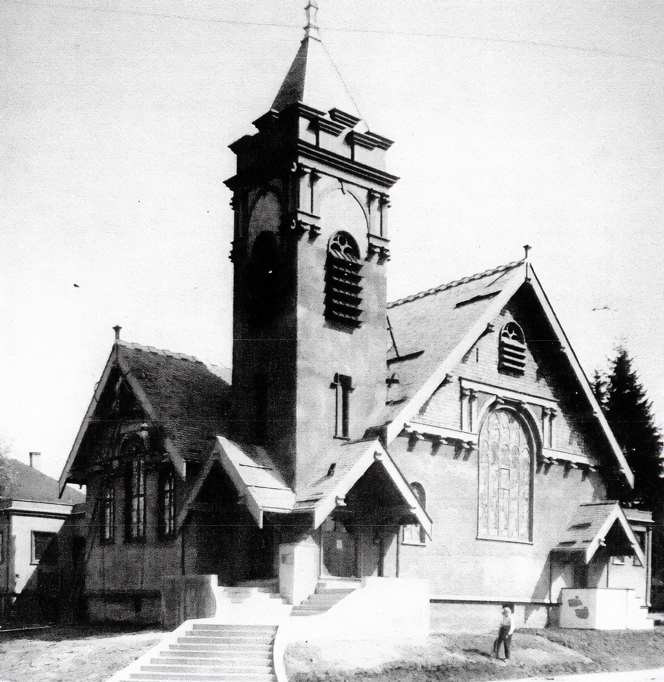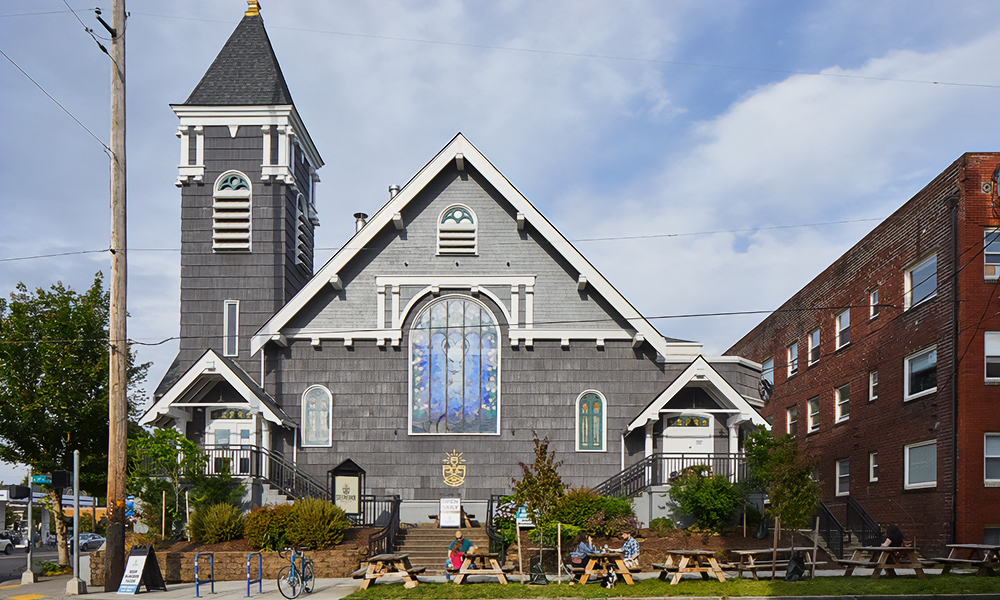We’re Here: Portland’s LGBTQ+ Historic Resources
Come Out in 2023
By Cayla McGrail
June has recognized LGBTQ+ Pride since the 1970s, beginning with Christopher Street Liberation Day and other activities in New York City honoring the infamous 1969 Stonewall Inn Riots. These New York events quickly spread across the country, with marches, parades and festivals celebrating and honoring queer legacies, histories, and lives throughout the entire month. Oregon is no exception, with the earliest Pride festivities occurring in June 1971.
In Portland, an expansive list of LGBTQ+ historic resources are currently being identified, documented, and preserved through the LGBTQ+ Historic Sites Project. Preservation of these resources – many of which are now 50 years old – is an emerging way to honor and cement the legacy of Pride. Portland’s project is funded by a 2021 Underrepresented Communities Grant, a National Park Service program intended to bring greater diversity to the National Register of Historic Places.The City of Portland’s Historic Resources Program is leading the project with the active involvement of community partners and individuals such as Donnie/Don Horn of Triangle Productions, Debra Porta of Pride Northwest, Anthony Hudson/Carla Rossi, and others. A team at Salazar Architect, Inc., comprised of Ernestina Fuenmayor, Kristen Minor, and Shayne Watson, is supporting the project with their combined decades of professional preservation expertise.

Storefront of Darcelle XV Showplace, 2022. (Photo Courtesy City of Portland)
Leveraging Oregon’s First LGBTQ National Register Landmark
Donnie/Don Horn and Kristen Minor’s 2020 National Register of Historic Places nomination of Darcelle XV Showplace successfully made the case for Oregon’s first LGBTQ site to receive local or national designation. The listing emphasizes the venue’s national significance as one of the oldest drag venues in the country, and a space that contributed to the cultural shift in gay acceptance and drag performances. The process and designation of Portland’s first LGBTQ National Register landmark illuminated the need and desire for a broader and deeper effort documenting the Rose City’s LGBTQ+ histories.
The LGBTQ+ Historic Sites Project emerged out of that success. Throughout 2023, project staff will be completing several main deliverables: historic resource surveys, a context statement, and nominations. The survey of 100+ properties across Portland is underway, documenting bookstores, bars, parks, and other significant spaces associated with histories from the early 1900s through the 1990s. These properties will inform the historic context statement with summaries of significant LGBTQ+ themes. The National Register of Historic Places nominations uplift a range of resource typologies connected to diverse experiences.
Steeplejack: A Site of LGBTQ+ Community and History
One resource being documented by the LGBTQ+ Historic Sites Project team is Steeplejack, a 2022 DeMuro Award winner. The building on NE Broadway is the previous location of Portland’s Metropolitan Community Church (MCC), an LGBTQ+- founded and affirming congregation originally formed in Los Angeles in 1968. MCC Portland had sporadic beginnings, utilizing spaces throughout the city from the Pythian Building on SW Yamhill to the Centenary-Wilbur Methodist Church on SE 9th. By 1977, the congregation purchased the building at NE Broadway for their permanent location. According to community historian David Grant Kohl, MCC Portland is one of only a few MCCs to have purchased their own location.

Photo of church nearing its construction completion, May 1910. Image from Oregon Historical Society (OrHi 64465).
Beyond the church’s significance to the intersections of religion and LGBTQ+ communities, the building hosted several social and support groups. For example, Susie Shepherd, longtime Portland LGBTQ+ activist, remembers the first all-gay recovery groups held in the building. In the late 1980s, the building hosted a 50-hour HIV/AIDS vigil and became a location where ACT UP (AIDS Coalition to Unleash Power) met. MCC was one of several churches active in the 1992 No on 9 campaign, fighting against Ballot Measure 9’s attempted amendment of the Oregon Constitution to “discourage homosexuality.”
Although the City of Portland’s 1984 Historic Resource Inventory briefly documented the building’s LGBTQ+ significance, the LGBTQ+ Historic Sites Project is providing a deeper record of that history and significance. MCC is not being considered for designation at this time. However, documentation of LGBTQ+ historic sites such as MCC provides public information, solidifies LGBTQ+ history as an important aspect of local significance, and establishes eligibility for future landmark designation.
Members of the public are invited to share their memories and experiences associated with Steeplejack/ Metropolitan Community Church and other Portland LGBTQ+ spaces through the project’s online questionnaire. Responses can be shared anonymously and may be incorporated throughout the project and its various deliverables. The questionnaire is open through July.

Façade of Steeplejack, 2022. The contemporary stained-glass window, installed in 1988, is an artistic memorial piece in reference to HIV/AIDS. (Photo courtesy of City of Portland)
Meet us at Pride!
The LGBTQ+ Historic Sites Project team will be at Portland Pride Waterfront Park Festival, July 15-16. Look for us at Booth A75 to share information and connect over memories of LGBTQ+ Portland. Visit the LGBTQ+ Historic Sites Project page and/or send your questions and feedback to Cayla McGrail at Cayla.mcgrail@portlandoregon.gov.
Cayla McGrail is an Associate Planner in Portland's Historic Resources Program. They hold a master's degree in Historic Preservation with a focus on Queer Preservation. Seeking to combine queer theories with preservation methods led them to become the Associate Project Manager of the LGBTQ+ Historic Sites Project at the City of Portland.
MORE FOR PRIDE MONTH IN OREGON
Resources to explore during LGBTQ+ Pride Month
Courtesy of Oregon Heritage
- Lesbian, Gay, Bisexual, Transgender and Queer (LGBTQ) Pride Month at The Library of Congress
- Eugene Lesbian Oral History Project (2020 Oregon Heritage Excellence Award winner, view award video here.)
- 2020 Heritage Excellence award winner The Darcelle Project, Portland, a multi-dimensional project that preserves and honors the story of Walter Cole, also known as Darcelle, and his achievements as an entrepreneur, performer, Portland icon, and activist for the LGBTQ community. The work included National Register nominations. View award video here and the national register nomination here
- Gay and Lesbian Archives of the Pacific Northwest (GLAPN)
- Oregon Encyclopedia is highlighting LGBTQ Pride Month on their monthly spotlight section on the home page
- Here is Oregon article - Where to celebrate Pride in Oregon this summer
- Just Out premiered on October 28, 1983. Printed bimonthly and distributed free around Portland, it provided a news platform and editorial voice for the region's LGBTQIA+ community at a time when traditional newsrooms were mostly unwelcoming to these stories. The Oregon Digital Newspaper Project have made editions from 1983 to 2011 freely available and keyword-searchable online here
- If you want to learn more about LGBTQ history in your community, don't forget to check out the local historical society and/or museum!

